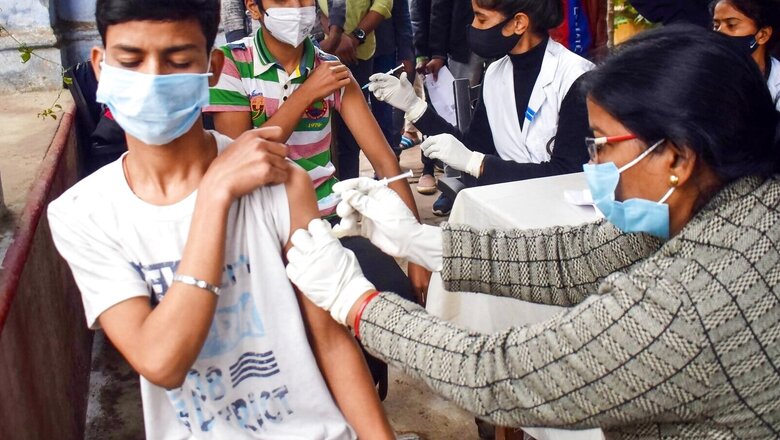
views
On April 14, 2020, India’s Prime Minister made an appeal to scientists and researchers to take the lead in developing a vaccine against the coronavirus. The government took a series of enabling policy and regulatory measures to encourage and incentivise the country’s scientists and private sector in this direction.
Early on in India’s fight against Covid-19, the government set up a Task Force focused on the vaccine as well as other science and technology issues. The Task Force was given the mandate of ensuring convergence among the government, academia, national laboratories, industry and regulators. ‘Mission Covid Suraksha’ was also announced with a committed budget of Rs 775 crore. The programme stated the goal to catalyse the development of at least five Covid-19 vaccine candidates for licensure.
Further, to provide guidance on all aspects of Covid-19 vaccination, an Empowered Group of officials was constituted. The group steered various crucial aspects of India’s vaccination efforts including procurement of vaccines, manufacturing, import, logistics, supply, utilisation and waste management.
Additionally, in August 2020, the National Expert Group on Vaccine Implementation for Covid was formed comprising key central ministries, five state governments and experts. The group was tasked with formulating an implementation strategy for the Covid-19 vaccine including the selection of vaccine candidates, procurement of vaccines, prioritisation of population groups for vaccination, enabling digital infrastructure, vaccine delivery platforms as well as several aspects of vaccine surveillance and safety. The National Technical Advisory Group on Immunization recommended vaccines for the national programme and also provided technical guidance for delivery.
On the regulatory front, the Special Subject Expert Committee was established to provide more fast approvals. Various critical guidelines to accelerate vaccine development and implementation were also formulated.
Another significant aspect of India’s Covid-19 vaccination efforts was the launch of the CoWIN application, which serves as a repository of vaccination data for every citizen who receives a vaccine shot and enters their name, mobile number and Aadhaar number into the system. That the citizen has taken their second dose and booster dose, if eligible, is also added to the database. This digital system contains information which is verifiable and has enabled the government to rapidly scale up the vaccination drive. Moreover, CoWIN enables citizens to download the vaccine completion certificate and present it as a proof when they travel, including to authorities in India and abroad.
The result of this expeditious and comprehensive policy and regulatory action as well as multi-stakeholder collaboration was that India was eventually able to put together a Covid vaccine wallet with the capacity of producing five billion doses in a year. By October 21, 2021, India had administered a total of 1 billion Covid-19 vaccine doses to its population, and by July 17, 2022, the cumulative number of doses delivered had touched two billion.
According to Our World in Data, India had administered more than 2.20 billion cumulative Covid vaccination doses to its citizens as on October 24, 2022, which was equivalent to the cumulative doses delivered by the European Union (911.65 million), the United States (638 million), Brazil (473.10 million) and Russia (179.79 million).
Even during the challenging times posed by a raging pandemic, India shared essential medicines with more than 150 countries. In January 2021, India launched the ‘Vaccine Maitri’ initiative with a “neighbourhood first” policy. As part of this initiative, India sent over 25 crore vaccine doses to 101 countries with the objective of helping all of humanity in its fight against the deadly virus.
A study of the vaccine doses delivered alongside the Covid-19-related fatalities recorded suggests that the vaccine was extremely effective in preventing mortality. The effectiveness of a single dose of the vaccine in averting death was 99%, whereas the effectiveness of two doses of the vaccine in preventing mortality was 99.4%.
The ‘Global Impact of the First Year of Covid-19 Vaccination: A Mathematical Modelling Study’ published in the Lancet Infectious Diseases Journal estimated that between December 2020 and December 2021, Covid vaccination averted 34.2 lakh deaths in India.
Not only have India’s Covid vaccines been effective, they are also among the most inexpensive in the world. According to data from UNICEF’s COVID-19 Market Dashboard, vaccines manufactured in India including Covishield (Serum Institute of India), Covaxin (Bharat Biotech) and Corbevax (Biological E) cost 1/7th the amount as compared to the vaccines manufactured in the United States by Pfizer and Moderna. In September 2022, India approved Bharat Biotech’s iNCOVACC, a Covid-19 recombinant nasal vaccine. The vaccine is administered as a spray through the nose, instead of as an injection. This makes it even more cost-effective as it does away with the need for needles, syringes, and trained professionals for vaccine delivery.
Urvashi Prasad is Director, DMEO, at NITI Aayog. With inputs from Dr. Vinod Paul, Member (Health), NITI Aayog. The views expressed in this article are those of the author and do not represent the stand of this publication.
Read all the Latest Opinions here




















Comments
0 comment